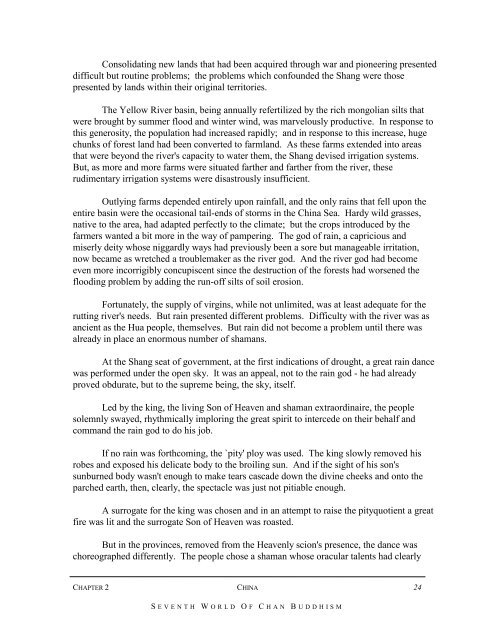seventh world of chan buddhism - Zen Buddhist Order of Hsu Yun
seventh world of chan buddhism - Zen Buddhist Order of Hsu Yun
seventh world of chan buddhism - Zen Buddhist Order of Hsu Yun
Create successful ePaper yourself
Turn your PDF publications into a flip-book with our unique Google optimized e-Paper software.
Consolidating new lands that had been acquired through war and pioneering presented<br />
difficult but routine problems; the problems which confounded the Shang were those<br />
presented by lands within their original territories.<br />
The Yellow River basin, being annually refertilized by the rich mongolian silts that<br />
were brought by summer flood and winter wind, was marvelously productive. In response to<br />
this generosity, the population had increased rapidly; and in response to this increase, huge<br />
chunks <strong>of</strong> forest land had been converted to farmland. As these farms extended into areas<br />
that were beyond the river's capacity to water them, the Shang devised irrigation systems.<br />
But, as more and more farms were situated farther and farther from the river, these<br />
rudimentary irrigation systems were disastrously insufficient.<br />
Outlying farms depended entirely upon rainfall, and the only rains that fell upon the<br />
entire basin were the occasional tail-ends <strong>of</strong> storms in the China Sea. Hardy wild grasses,<br />
native to the area, had adapted perfectly to the climate; but the crops introduced by the<br />
farmers wanted a bit more in the way <strong>of</strong> pampering. The god <strong>of</strong> rain, a capricious and<br />
miserly deity whose niggardly ways had previously been a sore but manageable irritation,<br />
now became as wretched a troublemaker as the river god. And the river god had become<br />
even more incorrigibly concupiscent since the destruction <strong>of</strong> the forests had worsened the<br />
flooding problem by adding the run-<strong>of</strong>f silts <strong>of</strong> soil erosion.<br />
Fortunately, the supply <strong>of</strong> virgins, while not unlimited, was at least adequate for the<br />
rutting river's needs. But rain presented different problems. Difficulty with the river was as<br />
ancient as the Hua people, themselves. But rain did not become a problem until there was<br />
already in place an enormous number <strong>of</strong> shamans.<br />
At the Shang seat <strong>of</strong> government, at the first indications <strong>of</strong> drought, a great rain dance<br />
was performed under the open sky. It was an appeal, not to the rain god - he had already<br />
proved obdurate, but to the supreme being, the sky, itself.<br />
Led by the king, the living Son <strong>of</strong> Heaven and shaman extraordinaire, the people<br />
solemnly swayed, rhythmically imploring the great spirit to intercede on their behalf and<br />
command the rain god to do his job.<br />
If no rain was forthcoming, the `pity' ploy was used. The king slowly removed his<br />
robes and exposed his delicate body to the broiling sun. And if the sight <strong>of</strong> his son's<br />
sunburned body wasn't enough to make tears cascade down the divine cheeks and onto the<br />
parched earth, then, clearly, the spectacle was just not pitiable enough.<br />
A surrogate for the king was chosen and in an attempt to raise the pityquotient a great<br />
fire was lit and the surrogate Son <strong>of</strong> Heaven was roasted.<br />
But in the provinces, removed from the Heavenly scion's presence, the dance was<br />
choreographed differently. The people chose a shaman whose oracular talents had clearly<br />
CHAPTER 2 CHINA<br />
S EVENTH W ORLD O F C HAN B UDDHISM<br />
24


